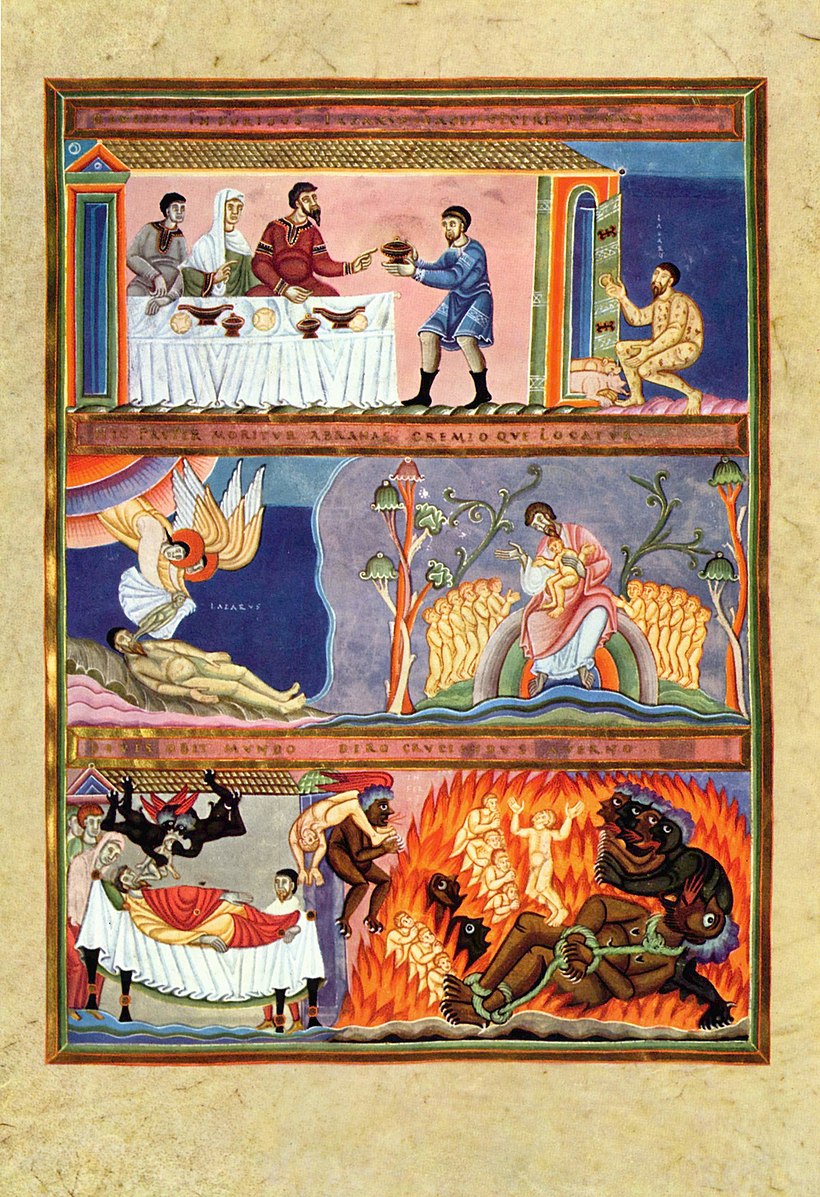1 John 4:16-21
Trinity Lutheran Church
Pastor James Preus
June 11, 2023
“God is love, and whoever abides in love abides in God, and God abides in him.” These are true and immensely important words written by the Apostle John; however, unless you know what love is, you can never understand what John’s statement means. Few words are as misunderstood by the world as the word love. A prime example is the observance of so called “Pride Month.” June has been designated by the executive branch of our federal government as LGBT+ Pride Month, which celebrates people identifying as lesbian, gay, bisexual, trans, etcetera. And our culture has largely joined in the celebration. Even children’s shows now teach children to celebrate LGBT Pride. And many churches and Christians have joined in celebrating LGBT Pride with the argument that it is loving. If you abide in God, you abide in love. And it is loving to affirm a person’s identity, or so they say.
But is it loving to affirm what God says is sin? Certainly not. Holy Scripture says that love “does not rejoice in wrongdoing, but rejoices in the truth” (1 Corinthians 13:6). And literally everything that is celebrated in LGBT Pride month is wrongdoing. First, take pride. Pride is evil. Nowhere in Scripture is pride ever promoted as good. Proverbs 11:2 states, “When pride comes, then comes disgrace, but with the humble is wisdom.” And Proverbs 16:18 states, “Pride goes before destruction and a haughty spirit before a fall.” The Virgin Mary sings of God, “He scatters the proud in the imagination of their hearts.” (Luke 1:51) And our Lord Jesus said repeatedly, “Everyone who exalts himself will be humbled, but he who humbles himself will be exalted.” (Luke 14:11; 18:14; Matthew 23:12) So, it is clear from Holy Scripture that we should never celebrate pride in any form. Rather, Scripture says, “The one who boasts, let him boast in the Lord.” (Jeremiah 9:24; 1 Cor. 1:31; 2 Cor. 10:17)
Pride is evil, even if your pride is in something good, like your work ethic, your healthy body, your beautiful garden, or your talented children. But to have pride in something sinful is all the more evil. This month we are told to celebrate LGBT+ Pride. LGBT+ refers to two sins: homosexual activity and transsexualism. Homosexual activity is called sinful in both the Old and the New Testament. God destroyed the cities of Sodom and Gomorrah in part for their homosexual activities. In Leviticus 18:22, Moses writes, “You shall not lie with a male as with a woman; it is an abomination.” And this is not a ceremonial law like the prohibition to eat pork or shell fish, which no longer applies to us (Colossians 2:16-17). It is a moral law, which cannot be done away with. The New Testament too prohibits homosexual activity. Romans 1 states, “For their women exchanged natural relations for those that are contrary to nature; and the men likewise gave up natural relations with women and were consumed with passion for one another, men committing shameless acts with men and receiving in themselves the due penalty for their error.” And in 1 Corinthians 6, St. Paul writes, “men who practice homosexuality… will not inherit the kingdom of God.” If you believe that the Bible is God’s Word, then you must acknowledge that homosexual activity is sinful and displeasing to God. Yet, even if we did not have these explicit passages, we would know that such activity is wrong, because it is an abuse of the sexual relationship which God has consecrated for marriage between a man and a woman, which in principle produces children (Genesis 1:28; 2:24).
What is now called transgenderism is also sinful. Jesus tells us, “From the beginning of creation, ‘God made them male and female.’” (Mark 10:6) To claim that a person can be the opposite sex or neither sex is contrary to Scripture. And those who promote such ideas cause immense harm to vulnerable individuals, many of whom are children. And the so-called doctors, who perform procedures attempting to change a person’s sex attempt to play God like Dr. Frankenstein. This ideology can be described as nothing less than demonic.
But am I being too harsh? I mean, these are real people who have these thoughts and feelings. Am I belittling them by speaking this way? Is it unloving to point out that these behaviors are sinful? By no means! We all have sinful passions and desires within us, which we must curb each end every day. It is not unloving to warn people to turn away from sin! And the fact that some of the most vocal critics of these sins are those who have turned from these lifestyles and have embraced Christ as their Savior gives credence that it is not unloving to call sin, sin.
We must remember what the wages of sin is. Death, eternal death! Where did the rich man go after he died? He went to hell, where there was an endless flame and constant torment. And that is what God threatens to everyone who does not turn from his sins! It is not loving to affirm people in their sinful desires. Rather, we should protect our children from such evil ideologies, and warn others to turn from these sins, so that they may be forgiven by Christ.
Yet, if Scripture is so clear that these activities are sinful and that those who do such things without repenting will not inherit the kingdom of God, why do so many Christians approve? Why are they so afraid to call sin, sin? Christians are not confident to defend the biblical teaching of love, because they suffer from a guilty conscience. St. Paul asks, “You who say that you must not commit adultery, do you commit adultery?” (Romans 2:22) So, the Christian, who has given into his lusts and sinful passions does not feel adequate to call others out on their sins. Jesus declares, “With the measure you use, it will be measured back to you.” (Luke 6:38) So, Christians, fearful that they will be judged for their own sins, refuse to call sin, sin.
But is that what Scripture means when it tells us not to judge, that we should condone sin? Certainly not! Doesn’t St. Paul warn that a little leaven leavens the whole lump? (1 Corinthians 5:6) If we condone sin, not only will those trapped in sin die and be judged for their sins, but our own sins will grow worse. Rather, the solution to both a guilty conscience and misunderstanding what God means by love is to understand the love God has for us. When God’s love makes our conscience clean, then we are confident to address sin, with the hope that others may be forgiven and have a clean conscience.
St. John writes, “We love, because He first loved us.” (John 4:19) Again, “In this is love, not that we have loved God but that He loved us and sent His Son to be the propitiation for our sins.” Christ shows what love is by putting our needs before His own, denying Himself for our sake, suffering and dying for our sins. He does not condone sin. He pays its price, so that we may be freed from its shackles. It is true that we should take the log out of our own eye before pointing out the speck in our brother’s eye. We take the log out of our eye by repenting of our own sins and trusting in Christ Jesus for forgiveness, because He died for those sins. Then we should with gentleness take the speck out of our brother’s eye, by warning him of his sin and pointing to Christ, who takes away all sins.
We are not saved by our love, yet those who are saved love. We are saved through faith in Jesus’ love. This is shown in our Gospel lesson by Lazarus ascending to Abraham’s bosom. Abraham is the man of faith. To him God promised that He would bless all nations through his seed. Abraham’s bosom represents God’s promise of salvation through Jesus Christ, the seed of Abraham, through whom all nations are blessed. Lazarus ascended to heaven to be with Christ and to receive from Him everything God promises and which Lazarus trusted he would receive through faith.
Faith produces love toward God and toward our neighbor. We cannot love God until we first believe that He loves us and forgives our sins. And this faith in God’s love produces a true love from our hearts, a love that would lose all things on earth rather than lose God. When we love God, we forsake sin for God’s sake, because it is our delight to please Him. Love toward our neighbor means that we desire for him what we desire for ourselves. So, we forgive as we have been forgiven and do not hold grudges against those who sin against us. And when we see our brother or sister in need, we seek to help, as St. John writes, “By this we know love, that He laid down His life for us, and we ought to lay down our lives for the brothers.” So, we see that true love is not satisfying one’s sexual lusts, but putting others before ourselves, starting with God.
The reason people get so confused concerning something so basic as love is because they ignore God’s Word in Holy Scripture. When we ignore God’s Word, we are ruled by our own sinful desires and are influenced by the wicked world and Satan. Abraham tells us that if one does not want to go to hell, he should listen to Moses and the Prophets (Luke 16:29, 31). Moses and the Prophets are Holy Scripture. But why does Abraham, who died hundreds of years before Moses wrote the first books of the Bible tell us that if we desire to go to heaven, we must hear the words of Scripture? Because all of Scripture teaches us the faith of Abraham, by which he was saved and by which everyone must be saved. Jesus says that all of Scripture hinges on the command to love the Lord God with all your heart, soul, and mind, and to love your neighbor as yourself (Matthew 22:40). And Scripture also teaches us that we cannot love until we first learn that God loves us through Jesus. Abraham believed God’s love for him, so he in turn loved God and his neighbor. And God works such love in everyone who has faith in God’s love.
Sadly, the reason people avoid going to church to hear these saving words of Scripture is the reason they need to hear these words in the first place. They avoid hearing God’s Word either because they do not love God or because they do not love their neighbor. People skip church to make money and to spend money, to gain what they truly value in this life and to spend what they truly value in this life. In both cases, it shows that they do not value God, who won and gives them salvation. People skip church, because they are not reconciled with others who go to church. They think they’ve been dissed or they have become offended somehow, so instead of talking to the person who has offended them, they avoid going to church. But Scripture tells us not to neglect meeting together, but to encourage one another, which would also include being reconciled with one another through the blood of Christ.
It is those who most need to hear God’s Word from Holy Scripture, who least want to hear it. And we should remember that for ourselves. When we don’t want to hear God’s Word, that is when we should run to hear it. It is by hearing God’s Word that we learn how God loved us first and redeemed us from our sins and rescued us from hell. And it is by hearing God’s Word that we learn to love God, forsaking our sinful desires, and to love our neighbor by looking out for what he needs. And it is gathering to hear God’s Word where we bring these two loves together, loving God and through such love loving our neighbor. This is the love we should desire. This is the love that comes from God. And this is the love that will not pass away, even in eternity. Amen.




 RSS Feed
RSS Feed